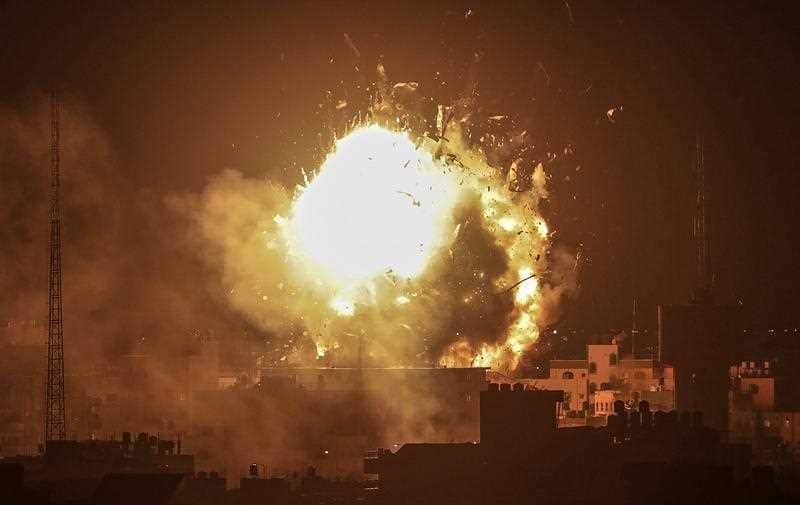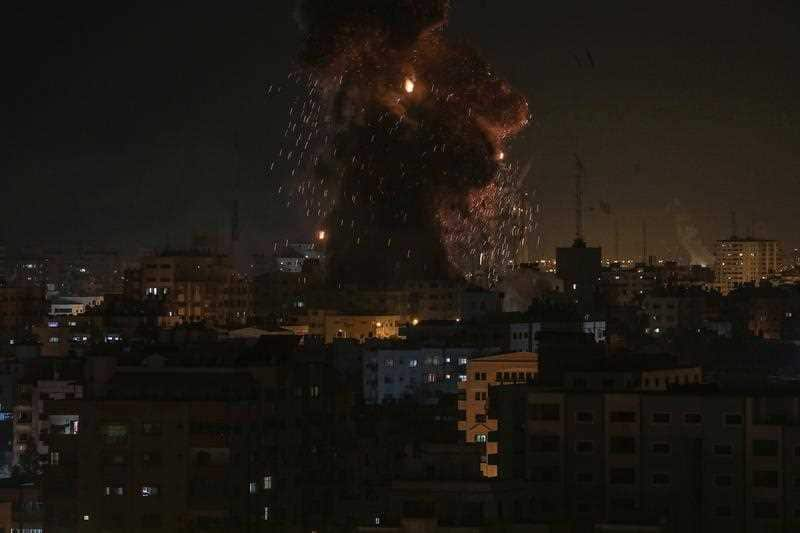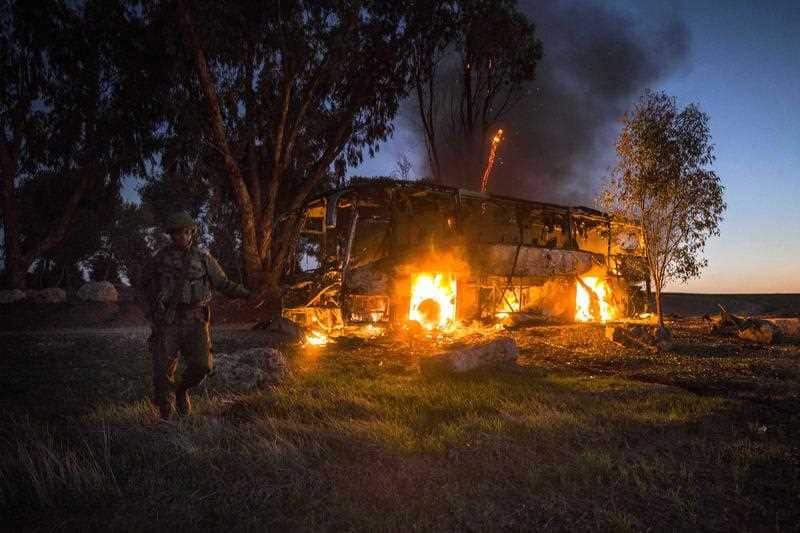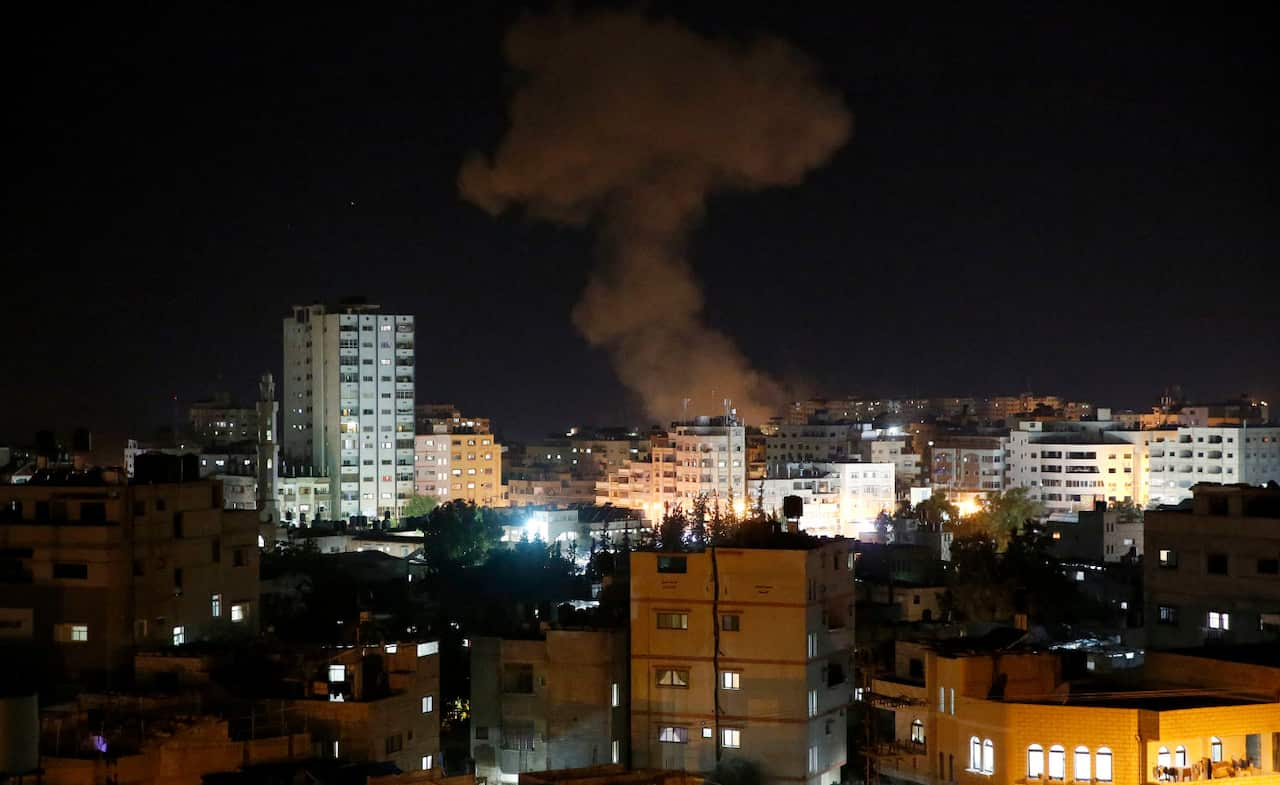One man has been pulled dead from the ruins of a building in southern Israel that was hit by one of dozens of rockets fired from the Gaza Strip.
It was the first confirmed death caused by the barrage of rocket fire from Gaza since Monday afternoon in a flare-up that follows a deadly Israeli special forces operation in the enclave.
A woman also recovered from the building in Ashkelon was in a critical state, said the emergency services organisation United Hatzalah. The man killed was around 40-years-old, according to media reports.
The rocket attacks come after an Israeli air strike earlier destroyed Hamas's Al-Aqsa TV building in the Gaza Strip, while a series of other targeted strikes killed three.
Hamas confirmed the TV uilding in Gaza City was destroyed, while Islamic Jihad vowed to respond to Israel's action.
No injuries were immediately reported and workers were believed to have evacuated after earlier warning shots.
The station began broadcasting again a short while after the strike from an undisclosed location.
Israel's military acknowledged hitting the building, saying in a statement "it contributes to Hamas's military actions, including by providing operational messaging to militants, directing and explicitly calling for terror activities against Israel, and providing guidance on how to carry out such terror activities".

Israel's military said it had so far struck more than 70 militant sites in response to 300 rockets fired from the Hamas-run territory Monday afternoon into the evening.
The flare-up came after a deadly Israeli special forces operation in the Gaza Strip on Sunday that left Hamas vowing revenge.
Missile defences had intercepted dozens of the rockets from Gaza and most others fell in open areas, though some hit houses and other civilian structures, the military said.
Medics reported at least 10 Israelis wounded.
The army said an Israeli bus was hit by an anti-tank missile from the Gaza Strip, causing several injuries. A soldier was severely wounded, it said.
Medics also said six people from the southern Israeli city of Sderot were lightly wounded.

Israeli police said a rocket hit a house in Netivot, another southern Israeli town.
Gaza's health ministry said three Palestinians were killed in the Israeli strikes and nine wounded.
Militant group the Popular Front for the Liberation of Palestine said two of those killed were its members, while the third was from Islamic Jihad's armed wing.
Palestinian militant groups in Gaza, including Hamas, claimed responsibility for the rocket fire and the missile attack on the bus, which they said was being used by Israeli soldiers.

Prime Minister Benjamin Netanyahu cut short a trip to Paris and rushed home as tensions rose, and on Monday convened a meeting of security chiefs.
'Exchange of fire'
Hamas said the initial rocket fire was in revenge for the deadly Israeli operation late Sunday.
Israel had stressed its covert operation was an intelligence-gathering mission and "not an assassination or abduction", but Hamas strongly denounced it and vowed revenge.
Israel signalled that Sunday's mission did not go as planned and resulted in the clash, which Palestinian officials said included Israeli air strikes.
In the immediate aftermath of the clash, Israel said it identified 17 launches - likely rockets or mortars - toward its territory from Gaza, with three intercepted by missile defences. No injuries were reported.

Hamas's armed wing, the Ezzedine Al-Qassam Brigades, said the Israeli special forces team had infiltrated near Khan Yunis in the southern Gaza Strip in a civilian car.
Al-Qassam agents stopped it and wanted to search it, realised it was an Israeli operation and confronted them, it said in a statement.
An exchange of fire followed in which local Al-Qassam commander Nour Baraka was killed along with another militant, it said.
The car then attempted to flee and Israeli aircraft provided covering fire.

An Israeli helicopter landed near the fence and took away the special forces troops, according to Al-Qassam.
Israeli military spokesman Jonathan Conricus declined to comment on the Al-Qassam account "because of the sensitive nature of the operation".
Israel provided few details on Sunday's operation, saying it was carried out by special forces and resulted in an "exchange of fire".
A funeral was held for the seven Palestinian militants on Monday attended by thousands, including masked Al-Qassam members carrying rifles, some firing into the air.
On the Israeli side of the border, residents said they had stayed close to shelters throughout the night.
"I was sitting in my living room and around 10 pm or 11 pm, I suddenly heard the sound of helicopter gunships firing," said Gadi Yarkoni, head of a regional council in the area and a resident of Nirim Kibbutz.
"It was right above the village I'm living in. It was very unpleasant."
Truce bid
The clashes came after months of deadly unrest along the Gaza-Israel border had appeared to be calming.
Recent weeks have seen Israel allow Qatar to provide the Gaza Strip with millions of dollars in aid for salaries as well as fuel to help ease an electricity crisis.
Before the flare-up, Netanyahu had defended his decision to allow Qatar to transfer the cash to Gaza despite criticism from within his own government over the move, saying he wanted to avoid a war if it was not necessary.
Naftali Bennett, Netanyahu's education minister and right-wing rival, compared the cash flow to "protection money" paid to criminals.
Israel and Palestinian militants in Gaza have fought three wars since 2008, and recent months have raised fears of a fourth.
Deadly clashes have accompanied major protests along the Gaza-Israel border that began on March 30.
At least 230 Palestinians have since been killed by Israeli fire, the majority shot during protests and clashes, while others died in tank fire or air strikes.
Two Israeli soldiers have been killed in that time.
Egyptian and UN officials have been mediating between Israel and Hamas in an effort to reach a long-term truce deal.


